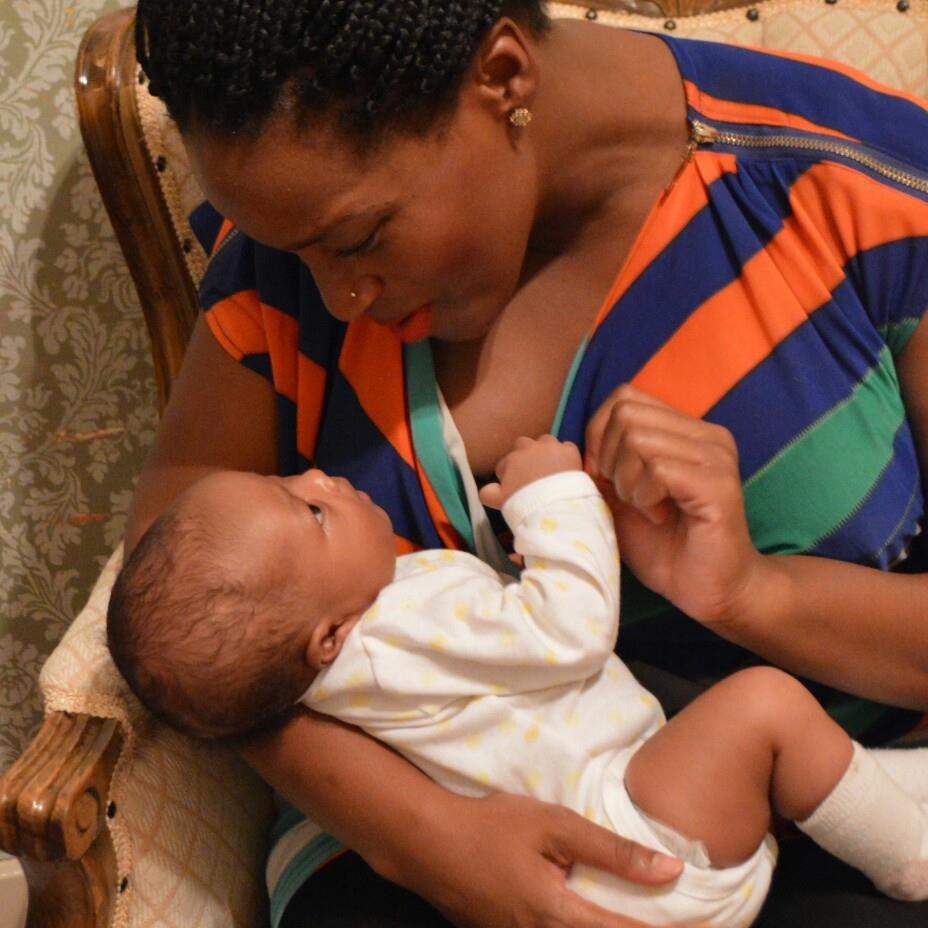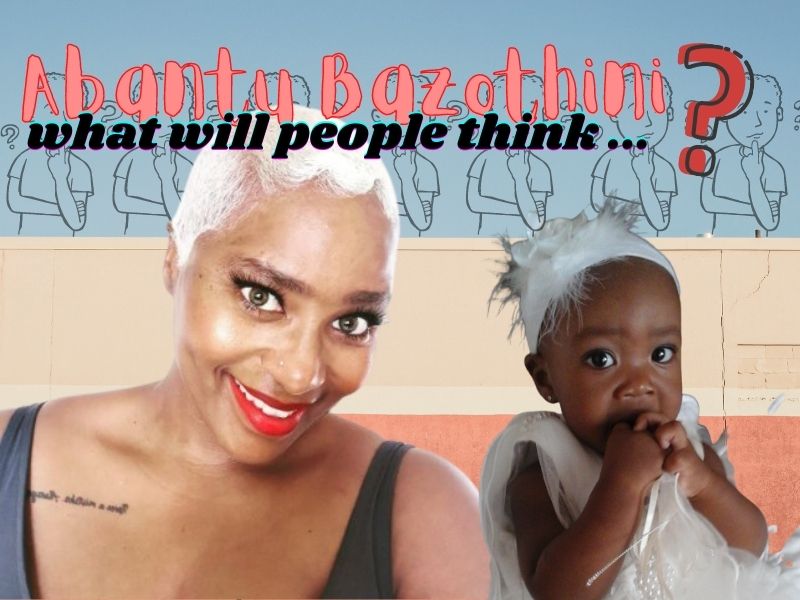A story by Sisanda Maqina about how she and her autistic and awesome daughter – Thapelo – continue to overcome “Abantu Bazothini ” Syndrome. This is a well-recognised and crippling South African social phenomenon. An example of this is spending money in order to impress social circles. This ‘syndrome’ often gets attention in the media.
Sisanda is a Xhosa mother with an autistic daughter named Thapelo. Sisanda prefers to view autism as Autistic Spectrum Diversity (ASD) rather than what the acronym stands for i.e. ‘Autistic Spectrum Disorder’.
The Beginning

The pregnancy had been normal with the unborn child being active in the womb and no issues were detected during the regular pregnancy scans.
Sisanda was active, going to gym twice a week and working throughout the pregnancy in the event management industry – busy with a project up to one month before the due date. She was involved in the Big Memorial race for Vuyu Mbuli (a well-known South African media personality).
The baby arrived before the due date via an emergency Caesar. Sisanda had been determined to have a natural birth and had not researched any other birthing methods. She was in pain for months after the birth due to the procedure. As a result, the new mother received a lot of help from family to take care of her baby daughter.
When Thapelo was around 10 months old, Sisanda noticed that her daughter constantly tapped on objects with her index finger. At this point she thought it was part of tactile babyhood exploring via touch. She had read early childhood development books and she took this behaviour with ‘a pinch of salt’ and shelved it as ‘every child is different’ (many of the baby books she read alluded to this).
Thapelo reached all the normal milestones on time and Sisanda had no reason to be concerned. Thapelo walked at 15 months.
According to Sisanda, Thapelo verbalised and spoke in the normal range for her age. Her first word was ‘dada’. Sisanda jokes that she was almost offended that the first word wasn’t ‘mama’. She later learned that this sound is easier for babies to say.
Sisanda made the decision to allow her daughter access to mobile devices as Thapelo is tech savvy. She uses devices to access nursery rhymes, movies and games.
The Relationship With Thapelo’s Father Becomes Strained
Sisanda and then partner were engaged to be married. They had moved house before the baby arrived. Sisanda had been retrenched which caused stress. Cracks appeared in the relationship and Sisanda felt that it could not continue.
She soon realized that she was functionally depressed. She had had a rude awakening. There was no time to curl up and mourn a failing relationship as there was a newborn to take care of. Sisanda reasoned with herself and remembered thinking ‘Babes, you NEED to figure this sh*t out QUICK!’.
Due to the loss of income, finances became strained and Sisanda and Thapelo moved in with family.
Mom and Daughter Alone
The Orange Grove house they moved to was bitterly cold in winter. Thapelo had colic and cried constantly at night. During the day, she was calm and visitors would comment on how sweet and peaceful she was. However, from around midnight until 4am there was a whole new colic nightmare which lasted up to 12 weeks. This increased Sisanda’s sense of isolation. Then suddenly the crying stopped.
Sisanda describes her mental state at this time as being ‘acres of an iceland’ that she needed to get through. That was when she started to compartmentalise. Not the best strategy but it worked for her.
Thapelo was sleeping and Sisanda finally had a chance to start processing the relationship with her daughter’s father.
She turned to the Bible and the verse that popped out was ‘Husband love your wives; wives respect your husbands’. That’s when she realised that it wasn’t the kind of marriage she wanted as a godly woman.
Later on as a part of her healing Sisanda made the conscious decision to co-parent with Thapelo’s father and she was determined that her daughter would get the best version of both parents.
The First Signs of ASD
Just before two years of age Thapelo started walking on tiptoes. She tapped with her index finger constantly. Her nicknames became Tippy Toes and Tappington.
Sisanda started growing more concerned and Googled ‘Children tapping’. With hindsight, it was the worst thing to do and the results led her straight to ‘autism’. Sisanda didn’t accept the Google diagnosis as Thapelo displayed none of the other symptoms listed for ASD.
Just after two years, Sisanda noticed that at social gatherings Thapelo would prefer to hang out with the adults and would not spontaneously play with the other children. She would play if a child came up to her but would not initiate social contact with other children.
Again, Sisanda thought ‘This child is different’.
There is a specialist paediatrician in Sisanda’s family – an uncle. Though he had observed Thapelo’s differences, to his credit he did not label Thapelo. He recommended that a neurologist be consulted.
All of the many tests undertaken (including a CAT scan, hearing and eye test) came back normal. Although Thapelo had a squint when looking at objects up close, there was no concern about that. Sisanda trusted the process, and viewed the tests as a normal part of elimination.
The Bombshell Diagnosis
After examining the tests the neurologist, based at Baragwanath Hospital in Soweto, gave a formal diagnosis of autism. Sisanda told the neurologist that she needed time to process the information.
Around this time, Thapelo was attending a Montessori nursery school and was fully potty trained. It was noticed that Thapelo held her pencil differently. Attempts were made to get her to use a tripod grip to no avail. Sisanda recalls that this was one of the profound lessons that she has learned through her daughter. Different is just that. Different. It’s not bad nor any less valuable. The way that Sisanda was taught to hold a pencil is not the way Thapelo had to hold a pencil!
Sisanda was obsessing over how to get back to work and take care of her child. Thapelo started seeing a speech therapist which helped calm things down – especially when the therapist gave the much needed advice to ‘stop with Dr Google’. The therapist explained that they would figure things out and not just look at how Thapelo interacted with others. Together they would look at the bigger picture. Sisanda started to feel the first bit of hope. She was still frightened and dealt with her fear of the future by isolating from friends and family rather than dealing with the questions that people would be asking.
Sisanda realised that she had to get it out of her mind that her child was disabled. She was different; not ‘wrong’.
The Family’s Response To The Diagnosis
The family started asking questions such as ‘What is wrong with Thapelo?’ ‘Why doesn’t she want to play with the other children?’ Sisanda was also constantly being pressurised and questioned about why she had made the decision to be a single mother.
Abantu Bazothini ? What Will People Think?
Sisanda had to navigate superstition and fear around difference in her daughter. There was a lot of familial stigma around ‘difference’. The family had screaming matches about ‘difference’.
Thapelo: The Prayer, The Light & The Gift
Sisanda’s path to acceptance and healing was to slowly shift her perspective of viewing a child with autism as a disability to thinking of her daughter as a different kind of blessing.
Her daughter’s name has two parts. Thapelo means ‘prayer’ in Sesotho – which honours her father’s Sotho heritage. uLukhanyiso means ‘light’ which honours Sisanda’s Xhosa heritage. Thapelo has become a light in Sisanda’s life.
Sisanda views her daughter as a gift. Thapelo runs up to strangers and hugs them. Sometimes people are reduced to tears if they are going through a hard time as the hug from Thapelo means the world to them.
Just like Sisanda learned to let go of what she thought ‘normal’ was, she is hoping to widen the circle of tolerance through her own family and eventually into the community.
Sisanda has found a way to healing the wounds. She actively chooses to work to keep a good balance as her daughter needs stability.
Sisanda is now healthily co-parenting with Thapelo’s dad. As parents, they realised that Thapelo needs interventions from both sides to focus on working together for Thapelo’s best interests. Thapelo now gets the best of both worlds from both parents. She often goes camping with dad.
The Key School
Sisanda was referred to The Key School for Specialised Education (Autism) by her speech therapist Wandile.
When they arrived at the school, Thapelo ran up to school Principal, Dr Jenni Gous, and gave her a hug. She felt at home at the school and Sisanda feels like the school is a place of safety for children with autism and their parents.
The Way Forward For Sisande, Thapelo and Others Living With ASD – A Parent’s Perspective
Different is just exactly that … Different (not bad).
Autistic kids are Awesome.
Adapt to what that difference is and move on.
Stop being clouded and confused by what you believe is the ‘norm’.
Certain things need to be unlearned – there needs to be paradigm shifts from time to time.
There is not enough information on autism. The little that is available is very generalised.
SO
Learn about what the autism spectrum is.
Find out what the early detection evaluators are.
Share information with other parents
Compile a list of practitioners and organisations specialising in ASD.
Make some noise on what is it that you require as a parent?
Start educating people one at a time.
Let’s normalise being different.
Teach our families and communities.
Learn from our children.
Become your child’s advocate.
Demand support from government especially from the various Departments of Education (education is some countries for children with autism is FREE).


Recent Comments